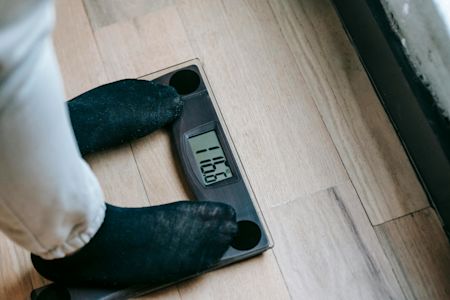Join me on my 7-Day Sugar-Free Challenge
Have you ever thought about going on a sugar-free diet?
Sign up to The Body Coach newsletter to get inspiration in your inbox every Monday.

In this guest post, Dr Louise Newson discusses the factors that influence weight gain during perimenopause and menopause – and answers the question many ask: 'Why am I gaining weight during menopause?'
Weight gain during the perimenopause and menopause can have a real knock-on effect on your self-esteem, body confidence and motivation.
It's common for women in my clinic to tell me that, while their eating habits haven't changed, the weight has crept up on them, particularly around their waist. For others, physical symptoms like joint pains mean they don't exercise as much as they did previously for fear of exacerbating their symptoms.
In a survey of almost 5,800 women for my book, The Definitive Guide to the Perimenopause and Menopause, two thirds (68%) said they had gained weight since the start of perimenopause or menopause but, encouragingly, a third (35%) of respondents said they were trying to eat a more balanced diet.
And while we often point the finger at our own behaviours, there is much more to menopausal weight gain than you might think.
During perimenopause and menopause, our bodies look to combat falling levels of the hormone oestrogen by trying to obtain it elsewhere – chiefly a different form of the hormone produced by fat cells called oestrone. Oestrone is less effective than oestradiol, the most potent type of oestrogen, and it's also inflammatory in your body.
Women can develop a 'spare tyre' in response to this and might also have strong cravings for foods high in sugar or unhealthy fats, which the body will, in turn, lay down as oestrone-producing abdominal fat.
Lower levels of oestrogen and testosterone can often cause widespread muscle and joint pains, and many women will reduce their day-to-day exercise because of this.
Falling oestrogen can disturb your sleep patterns for several reasons: hot flushes and night sweats, as well as disruption to the sleep hormone melatonin and raised levels of the stress hormone cortisol.
Leptin and ghrelin are two other hormones that are closely linked to weight. Leptin acts as an appetite suppressant and ghrelin is an appetite stimulant. Increased fat in the body can cause leptin resistance, which means that the normal signals to let you know you are full become disrupted.
Sleep also has an important part to play in the regulation of these two hormones; poor sleep can increase ghrelin, making you feel hungry, and decrease leptin, which stops you from feeling full.
Declining testosterone levels can lead to a decrease in muscle mass and lower energy levels. This, in turn, can reduce your baseline metabolic rate; fewer calories are burned, even with the same nutritional intake as before your perimenopause. Low testosterone can also lead to symptoms such as low mood, reduced energy, poor motivation, muscle and joint pains and poor sleep.
Neurotransmitters such as dopamine, oxytocin and serotonin are chemicals that often impact mood and the reward centres in your brain, and fluctuating oestrogen and testosterone can influence the levels of these neurotransmitters.
Dopamine is often released when thinking about a 'reward' or pleasurable experience and can be linked to repeated patterns of behaviour, such as comfort eating at the end of a stressful day. Serotonin is responsible for improving your mood and can be affected by fluctuating hormones. It has an effect on appetite regulation and, as well as being produced in your brain, it is also produced in your gut.
It's really important to take a holistic approach to maintaining a healthy weight in menopause and beyond – if you do need to lose weight, it's best to concentrate on sensible but meaningful modifications rather than relying on a fad diet or diving headfirst into an unsustainable fitness drive.
Weight changes often improve with some simple tweaks to your diet and a real focus on balance. The Mediterranean diet, which isn't a 'diet' per se, is a great starting point. Inspired by the way people traditionally eat in coastal Mediterranean countries, it contains plenty of fruits, vegetables, beans, nuts, seeds, whole grains and unsaturated fats such as olive oil. It also includes moderate amounts of dairy foods, eggs, fish, and poultry, and a limited amount of red meat and saturated fat, such as butter.
If you are experiencing perimenopausal or menopausal symptoms that are affecting your sleep, eating habits and motivation for physical activity, then you should speak to a healthcare professional. Hormone replacement therapy (HRT) is usually the first line treatment for management of menopause symptoms. Some women find that taking the right dose and types of hormones can lead to weight loss as metabolism can improve with hormones.
If you have become more sedentary, I'd advise you stop thinking about 'exercise' and start thinking about 'activity' or 'movement' instead. This will make it feel more manageable and less daunting. Make space in your diary for some activity every day – whether a lunchtime walk or setting the alarm a little earlier to fit in an online class.